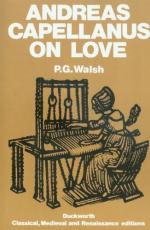|
This section contains 11,774 words (approx. 40 pages at 300 words per page) |

|
SOURCE: “Andreas Capellanus: A Reading of the Tractatus,” in MLN, Vol 88, No. 6, December, 1973, pp.1288-1315.
In the following essay, Singer contends that Capellanus's rejection of courtly love in the third book of De Amore is made reluctantly, after he has tried and failed to reconcile it with religious love.
In the modern world many writers have been fascinated by the image of courtly love as a doctrine originating in 12th-century France. If one looks for major texts in that period, however, one finds that they are very few in number. The troubadours of Provence mainly wrote poetry; and though their verse is often philosophical, they made no efforts to codify their views. Theirs is a conglomeration of scattered expressions, diverse ideas. Only in its northern version does French courtly love receive a doctrinal formulation. Even then, there is only one great text: the Tractatus amoris & de amoris remedio...
|
This section contains 11,774 words (approx. 40 pages at 300 words per page) |

|


